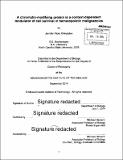A chromatin-modifying protein is a context-dependent modulator of cell survival in hematopoietic malignancies
Author(s)
Shingleton, Jennifer Ricks
DownloadFull printable version (8.580Mb)
Other Contributors
Massachusetts Institute of Technology. Department of Biology.
Advisor
Michael Hemann.
Terms of use
Metadata
Show full item recordAbstract
Proteins that modify chromatin architecture are important drivers of leukemia. Many genetic lesions in hematopoietic malignancies lead to altered function of one or more chromatin-modifying proteins, often resulting in less differentiated cells that are more therapy-resistant. While a number of these lesions have led to development of effective targeted therapies, most have not. Identification of additional chromatin modifiers that affect disease progression may result in more amenable drug targets. With this in mind, our group carried out a large-scale RNA interference (RNAi) screen for factors influencing disease progression in a murine model of BCR-Abl+ B-ALL, a disease with low long-term survival rates despite treatment with inhibitors targeting the BCR-Abl kinase. This screen identified two chromatin-modifying genes, Chd8 and Sin3a, as necessary for growth and survival of leukemic cells. While SIN3A is a well-characterized transcriptional co-repressor, the exact mechanism and relevance of CHD8 is less clear. Here we demonstrate that RNAi-mediated depletion of CHD8 in BCR-Abl+ B-ALL cells leads to cell death, most likely in a caspase-independent manner and without a preceding cell cycle arrest. While multiple kinds of B cell malignancies were dependent on CHD8 expression for survival, two T cell malignancies displayed significantly milder phenotypes upon CHD8 knockdown. In addition, ectopic expression of the intracellular domain of Notch (ICN) in one of these T cell malignancies partially alleviated the detrimental effect of CHD8 depletion. Although CHD8 has been shown to bind to many active promoter sites, results of RNA-Seq analysis did not show significant expression changes of any particular genes upon CHD8 depletion, suggesting that CHD8 may act to regulate transcription of a large number of genes in a modest way. We show evidence that CHD8 promotes NF-KB signaling, as levels of phosphorylated ReIA decrease upon CHD8 knockdown and addition of recombinant TNFa partially rescues the CHD8- depletion phenotype in BCR-Abl+ B-ALL cells. Our results demonstrate that CHD8 has a crucial role in cell survival, and its inhibition may be an effective treatment for B lymphoid malignancies that circumvents resistance to current therapies.
Description
Thesis: Ph. D., Massachusetts Institute of Technology, Department of Biology, September 2014. Cataloged from PDF version of thesis. "September 2014." Includes bibliographical references.
Date issued
2014Department
Massachusetts Institute of Technology. Department of BiologyPublisher
Massachusetts Institute of Technology
Keywords
Biology.